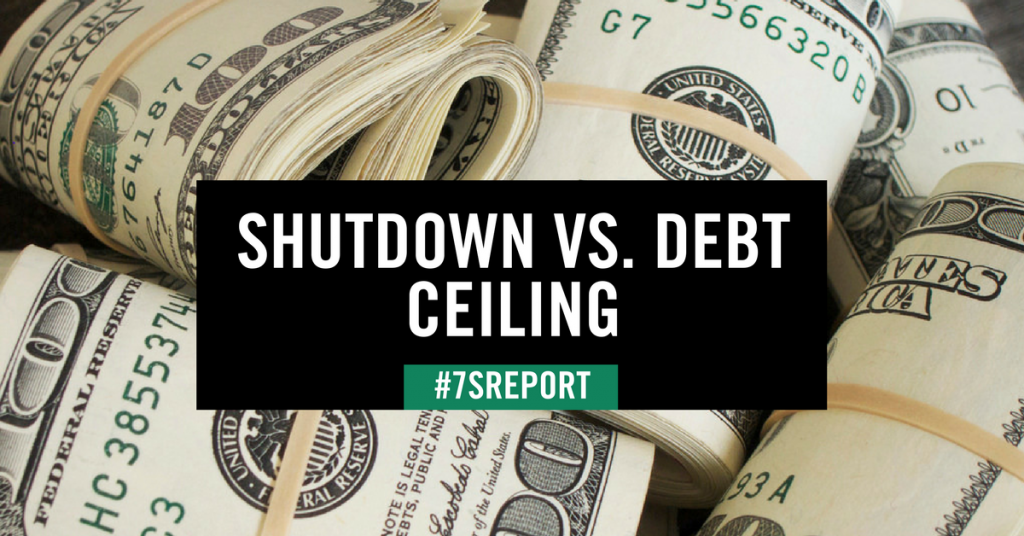
The Sevens Report is everything you need to know about the markets in your inbox by 7am, in 7 minutes or less. Start your free two-week trial today—see what a difference the Sevens Report can make.
Washington will be at the epicenter of markets in September, and for four reasons: Progress (or lack thereof) on tax cuts, Fed balance sheet reduction, debt ceiling increase and government shutdown. I’ve covered the first two in the Report at length, but I haven’t spent a lot of time on the latter two events.
And, once media coverage moves on from the tragedy of Hurricane Harvey, as it undoubtedly will shortly, it will refocus on Washington, and specifically the debt ceiling and government shutdown, as both are coming up fast.
The shutdown and debt ceiling fight have the potential to cause a pullback in stocks, and both will undoubtedly be referenced by scary headlines on the financial media.
In reality, the chances of either event actually hitting stocks is low, and I want to spend a few minutes to give you the “need to know” on each event, and what needs to happen for either event to push stocks lower.
Government Shutdown Deadline Dates: September 30th. Why It’s A Potential Problem: The border wall. What Needs To Happen: Congress must pass a budget by that date or begin to close non-essential government services. Last Time It Happened: 2013. Will It Cause A Pullback? Almost certainly not.
The fight here seems to revolve around Trump’s border wall. The president wants funding for the wall included in the budget, but Democrats have vowed to vote against any budget that includes the border wall.
That stalemate could cause a shutdown as Republicans would have to vote as a block to pass the budget over Democrat opposition, and that’s just not something that’s likely to happen.
What Likely Happens: September 30th isn’t a hard deadline, as Congress can pass short-term “continuing resolutions” to keep the government funded and open while the negotiations get settled. Probability of a Shutdown: 20%.
Debt Ceiling. Deadline Date(s): September 30th, midOctober. Why It’s a Potential Problem: Because it’s Washington, and they can’t do anything easily (at least not so far). What Needs to Happen: Congress must pass a debt limit extension by the deadline. Last Time It Happened: Never. The government has never failed to raise the debt ceiling, although there was a big scare in 2011 that spooked markets. Will It Cause A Pullback? Almost certainly not.
There isn’t any specific issue that could cause the debt ceiling to not be extended, but again, it’s Washington—so nearly anything is possible.
What Likely Happens: Of the two issues (government shutdown and debt ceiling) the debt ceiling is the much more serious one, because there isn’t the ability to kick the can down the road like there is with funding the government (i.e. no short-term extensions). So, I’d expect the debt ceiling will be raised with (relatively) little drama. Probability of a Default (i.e. not raising the debt ceiling): 15% (and that’s probably a mild over estimation).
Bottom Line
These two events will dominate headlines in the coming weeks, but a cold, unemotional look at the facts strongly suggest these are not going to be material headwinds on the markets this fall.
Progress (or not) on tax cuts, earnings, economic data and geopolitical dramas are the major threats to this 2017 rally as we enter the stretch run into year end.
The Sevens Report is the daily market cheat sheet our subscribers use to keep up on markets, seize opportunities, avoid risks and get more assets.



